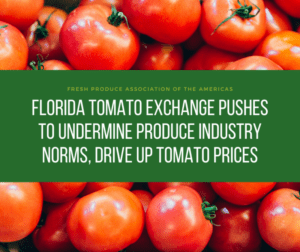Jun 20, 2023Fresh Produce Association of the Americas challenges Florida tomato growers
The Fresh Produce Association of the Americas (FPAA) is challenging Florida growers’ calls to end the 2019 Tomato Suspension Agreement.
On June 16, the Florida Tomato Exchange (FTE) filed a request with the U.S. Department of Commerce to terminate the suspension agreement because “it has failed to stop unfairly traded Mexican tomatoes from destroying the U.S. tomato industry.”
 Duties requested by FTE would limit vine-ripened tomatoes, harm U.S. businesses, and drive-up consumer prices in the face of crippling food inflation, FPAA officials said in a news release. “Seeking monopoly, Florida Tomato Exchange at it again with off-base claims,” FPAA said in the release.
Duties requested by FTE would limit vine-ripened tomatoes, harm U.S. businesses, and drive-up consumer prices in the face of crippling food inflation, FPAA officials said in a news release. “Seeking monopoly, Florida Tomato Exchange at it again with off-base claims,” FPAA said in the release.
“The recent request by the Florida Tomato Exchange (FTE) asking the Department of Commerce to withdraw from the 2019 Tomato Suspension Agreement jeopardizes the availability of the variety of tomatoes that US consumers expect at prices they can afford and would harm U.S. businesses. Through these actions, the FTE continues to attempt to use antidumping laws for the unintended purpose of creating a monopoly for themselves in the marketplace and covering for their unwillingness or inability to innovate and adapt to changing market demands,” FPAA said in the release.
“The FTE has been making the same false claims for years, but when pressed to present evidence in regulatory proceedings, they have failed to do so because their claims are untrue, nothing but propaganda intended to skew the political process to their advantage, regardless of the cost to consumers, retailers, and even other American farmers,” FPAA said in the release. “The duties that are being sought by the FTE would harm U.S. importers but would ultimately be paid by American consumers who want better tomatoes, not higher prices, reduced varieties, and lower quality tomatoes.”
 “The allegations by the Florida growers are as timeworn and tired as their gassed green tomatoes,” Lance Jungmeyer, FPAA president, said in the release. “Consumers overwhelmingly prefer the flavor of vine ripened tomatoes over gassed green tomatoes like those from Florida. Mexico is a major supplier of vine ripened tomatoes which is one reason why the FTE wants to erect a trade barrier. There really is no substitute for a vine ripened tomato, and to put in duties would simply amount to another tax that shoppers just can’t afford.”
“The allegations by the Florida growers are as timeworn and tired as their gassed green tomatoes,” Lance Jungmeyer, FPAA president, said in the release. “Consumers overwhelmingly prefer the flavor of vine ripened tomatoes over gassed green tomatoes like those from Florida. Mexico is a major supplier of vine ripened tomatoes which is one reason why the FTE wants to erect a trade barrier. There really is no substitute for a vine ripened tomato, and to put in duties would simply amount to another tax that shoppers just can’t afford.”
The FTE is a special interest group whose members have failed to innovate, FPAA said in the release. “What they fail to mention publicly is that many of the largest Florida growers clamoring for protection are also some of the largest financers/owners of growing operations in Mexico and some of the largest buyers of Mexican tomatoes in the U.S. The wealthiest handful of FTE members also control networks of regional tomato repackers across the U.S. that, in turn, control access to retail markets. They position themselves as victims in an attempt to game U.S. trade law to create a monopoly for themselves in the tomato market by ensuring a market for selling inferior tomatoes and controlling the flow of their own Mexico-sourced tomatoes at higher prices caused by duties. If the FTE gets its way, a vast majority of U.S. importers would be harmed as FTE members expand their control of what tomatoes consumers can buy at significantly higher prices.”
 Such a political action by the U.S. acting on behalf of a U.S. special interest group would almost certainly result in retaliatory actions by Mexico, the second largest importer of US agricultural products, FPAA said in the release. U.S. growers of other commodities that rely on Mexico as a key export market would be hurt in the FTE effort to line the pockets of a small number of wealthy Florida businessmen, FPAA said in the release.
Such a political action by the U.S. acting on behalf of a U.S. special interest group would almost certainly result in retaliatory actions by Mexico, the second largest importer of US agricultural products, FPAA said in the release. U.S. growers of other commodities that rely on Mexico as a key export market would be hurt in the FTE effort to line the pockets of a small number of wealthy Florida businessmen, FPAA said in the release.
Tomatoes sold in the U.S. from Mexico are controlled by the U.S. Department of Commerce through the Tomato Suspension Agreement which sets minimum pricing, puts in place requirements for sales between importers and buyers, requires exhaustive inspections for quality, and has stringent enforcement and compliance monitoring measures in place. This includes regular quarterly audits, administrative reviews, on-site audits from the U.S. Department of Commerce, and enforcement measures in place in Mexico. “Contrary to FTE’s false claims, the Department of Commerce has consistently found Mexican tomatoes have complied fully with the Tomato Suspension Agreement. Since the implementation of mandatory quality inspections that Florida growers demanded under the 2019 Tomato Suspension Agreement, 99.992 percent of all tomatoes that must be inspected from Mexico have met or exceeded all quality requirements,” FPAA said in the release.
Read the full FPAA release here.
















